It’s looking as if the 2015 legislative session could bring a change that Portland transportation advocates have dreamed of, without much hope, for years.
“At this point, jurisdictional transfer is on the table.”
— Michael Dembrow, Oregon State Senator (D-Portland)
Several months ago, Portland Mayor Charlie Hales memorably described the fight over whether the state or city should own Portland’s urban highways as two people at a restaurant who keep pushing the check to each other. At a town hall Thursday at Portland Community College on 82nd Avenue, a team of state legislators essentially kicked off a campaign to start paying the bill.
That’d mean finding state money to improve enough of 82nd Avenue’s sidewalks, pavement and crosswalks that the City of Portland would be willing to take responsibility for the much-used but deadly five-lane road that once marked its eastern border.
“There are needs for urban highway transfers from one side of the state to another,” state Sen. Michael Dembrow told the crowd Thursday. “At this point, jurisdictional transfer is on the table.”
Gerik Kransky, advocacy director for the Bicycle Transportation Alliance, said in an interview Friday that moving 82nd Avenue from the Oregon Department of Transportation to the Portland Bureau of Transportation would be a major boon in improving the bikeway crossings at Mill and Burnside, among other spots.
“Those are things that PBOT knows how to do and it’s not as much of a priority for ODOT,” Kransky said. “The City of Portland is a little bit more experienced when it comes to the needs of a neighborhood and of a community than the state department of transportation.”
Dembrow said the money to make jurisdictional transfers possible would need to come from “a package of transportation initiatives coming out of the legislature,” possibly in 2015.
“A number of legislators and other people have been meeting for quite a while toward that end,” Dembrow said.
Last December, we shared news that Mayor Hales was backing this plan.
The most likely scenario, according to Metro lobbyist Randy Tucker, is a statewide one-cent gas tax increase that would raise $26 million a year and be dedicated entirely to bringing state roads up to local standards so they could be moved under local control.
Tucker said the Oregon Transportation Forum, a broad-based coalition of transportation interests that includes the BTA, TriMet, AAA Oregon and the Oregon Trucking Association, had unanimously agreed Thursday to endorse such a tax hike in combination with various other transportation initiatives.
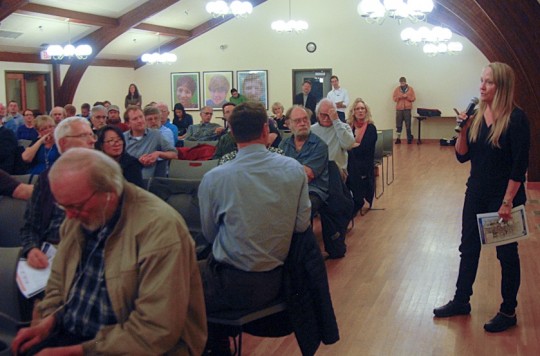
Meanwhile, many citizens participating in Thursday’s town hall testified to the many problems with 82nd Avenue.
“It has areas where buildings come to within about two feet of the curb,” said John Mulvey of the community group Foster United. “It has areas where it’s impossible to get even as a fully healthy adult, let alone someone who needs a wheelchair.”
Lew Scholl, land use and transportation chair of the Montavilla Neighborhood Association, said that only large-scale redevelopment would bring in enough money to fully improve the street, and that as that happens the state should reduce the number of driveways fronting on the highway.
“They’d be real sidewalks instead of just driveway sidewalks,” Scholl said. “There wouldn’t be the need for the continual left-turn lane all the way down.”
Advertisement
Carol Otis, the owner of Cartlandia, pleaded local policymakers to help solve what she called a “pothole” at her popular food cart pod’s driveway: a break between street and parking lot that she said bureaucratic issues seemed to be preventing anyone from fixing.
Metro Councilor Bob Stacey, who represents the area, noted that investments in 82nd would complement the investments that are now being planned on Division. The regional planning agency is in talks about a plan that might add a bus rapid transit line along Division and Powell, with half the construction costs coming from the federal government.
“It’s going to cross 82nd,” Stacey said. “We think the right place to cross it is here.”
Sitting at the front of the room with his House colleagues Alissa Keny-Guyer and Barbara Smith Warner on either side, Dembrow said jurisdictional transfer of 82nd to the city might help all of these issues.
“The sense I’m getting from the community is this is something we should be pursuing,” he said, noting that the 2015 legislative session will have many competing priorities. “It’s going to require everyone who has an interest in that to get involved.”
Dembrow urged people at Thursday’s meeting to write their legislators — including Dembrow himself — in support of funding jurisdictional transfers.
“Hearing from you about this issue as something that we should be pursing really strengthens our hand,” Dembrow said.
Not every voice on Thursday supported the proposal to transfer ownership of 82nd, however.
“If you give it over to the city, they’re not going to have the money to do what they want to do,” said Terry Parker of the Rose City Park Neighborhood Association. “They already don’t have enough money. I was at the meeting last night on the street fee, and they’re short.”
In a conversation with Tucker after the meeting, Parker added another concern.
“If Portland gets ahold of the street, they’re going to make a mess of it for drivers,” Parker said.



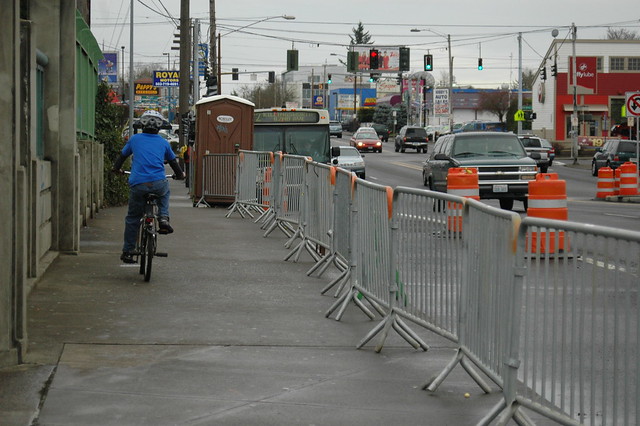
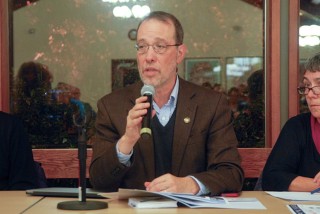
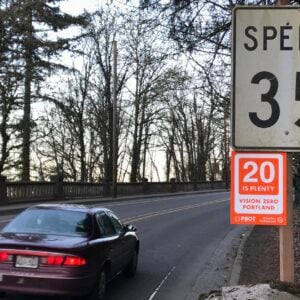
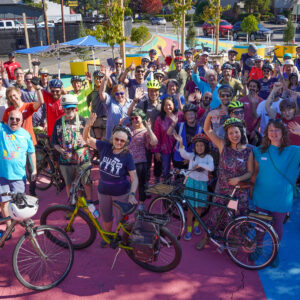
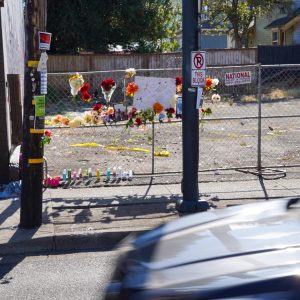
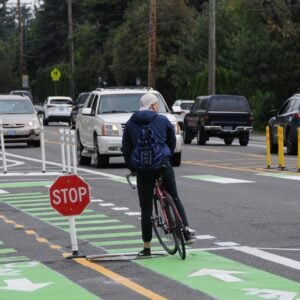
Thanks for reading.
BikePortland has served this community with independent community journalism since 2005. We rely on subscriptions from readers like you to survive. Your financial support is vital in keeping this valuable resource alive and well.
Please subscribe today to strengthen and expand our work.
This would be huge and welcome.
http://bikeportland.org/2010/02/19/a-view-from-other-side-of-the-rogue-wall-on-82nd-29755
^ Remember this?
On a roll? How about throwing in Barbur Boulevard while we are at it?
ODOT wants Barbur. They’re obsessed with the idea that they’ll need it in 20 years when I5 can’t handle the number of cars they forecast.
We’ll pay for 82nd if you just stripe Barbur how we want it, and you can change it back in 20 years if you’re right about the traffic counts.
The proposed one-cent gas tax hike could be used for any jurisdictional transfers that are mutually agreeable to ODOT and local agencies. Before resigning in late summer, ODOT’s Jason Tell basically offered to put Barbur on the table for a transfer if PBOT could find the money.
I would expect to see a transfer proposal for Barbur if/when the funding for all the proposed SW Corridor improvements starts to come together since that conceivably would bring most of Barbur up closer to PBOT standards.
I also think it’s almost guaranteed to happen since at least some Barbur ROW will almost certainly be taken over for whichever option of LRT or BRT that is chosen and as with Interstate Ave ODOT doesn’t want to deal with that for a variety of reasons.
One cent per gallon increase is only enough to pay for the inflation associated with road maintenance increases for existing state highways. It will take more increases than that to make anything positive happen.
In 1993, Oregon’s gas tax was 24 cents per gallon. It was finally raised to 30 cents per gallon in 2011 – a 25 percent increase. But during the last 21 years, the Corps of Engineers’ construction cost index has increased by 70 percent! Just to keep up with inflation for the last 21 years, Oregon’s gas tax should be 40.8 cents per gallon!
I’m all for transferring 82nd and Barbur and most every other non-interstate facility to Portland, but the price tag is going to be enormous. You’d probably need a penny per gallon for each of those roads.
Either Portland or ODOT could do a lot of really great stuff, but it will take lots of money. (And, yes, I believe ODOT could do it.)
It’s our job now to start pestering the legislators to increase the gas tax so some of this stuff could happen.
If the legislature is going to go through the trouble to increase the gas tax, I can’t image that they’d only go for 1 cent. They’ll got for a lot more and earmark that 1 cent for fixing roads so that they could be transferred.
That is exactly what they said. It may also include title registration increases.
If the current vote totals hold, and Bruce Starr loses his seat, dems would have 18-12 in the senate and 35-25 in the house.
After short term transportation funding and inclusionary zoning, we may have a real chance for a carbon tax if Kitz can get it together enough for a comprehensive tax reform package. That would be real progress.
I think that increases in title and registration fees are inappropriate. The demands on the transportation system are created when cars are being used, not when they are in your garage or driveway.
I already pay more in license and registration fees than I pay in gas tax because I only drive about 3000 miles per year. My two-year registration is $86 to the state and $38 to Multnomah County for the Sellwood Bridge. The cost of my driver’s license works out to another $6 per year.
Just increase the gas tax so those who use the roads more also pay more.
Agree. Flat fees are regressive.
Just a friendly suggestion that increasing the gas tax is unfortunately also regressive, because as income goes down the proportion paid will go up. True, the very poor probably don’t own a vehicle but the poor that do, gas is probably a huge component of their budget.
Though gas tax is more regressive than other taxes, rich people who own cars actually tend to drive quite a lot more than poor people who own cars, and so on up and down the income ladder. So it’s a little less regressive than you might expect.
Do you have a good source for this Michael? I’d be interested in reading it.
See “average annual vehicle miles per household” on the second page of this PDF:
http://nhts.ornl.gov/2009/pub/profile_2012.pdf
Households that make $75k+ drive 26 percent more than households that make $50k-$75k, and 74 percent more than households that make $25k-$50k.
Also, a lot of poor folks drive gas guzzlers, because that is what is usually available at the Buy Here Pay Here. Or they got grandma’s 1980 Lincoln as a hand me down.
True. Stay tuned for a follow-up post on Monday.
This would be amazing! 82nd Avenue ceased to function as a “state highway” in the true definition as soon as I-205 was built parallel to it.
I don’t think the road houses much traffic traveling from Washington State to California, let’s put it that way.
The idea that ODOT still owns this road is baffling to me. I hope this turns out to be like ODOT’s handing-over of Sandy Boulevard to PBOT. They handed it over to PBOT with a bunch of money to maintain it for a few years. PBOT *immediately* went in and installed some improvements – crosswalks etc.
Let’s not forget that ODOT needs to cough up whatever money they get now for 82nd Ave and redirect it to PBOT. It may not be enough to bring it up to our standards, but it is surely not zero.
While I certainly agree many things need to be fixed on 82nd. I too am hesitant that PBOT is the right direction here. As pointed out in the article the Street Fee debacle has left a bad taste in many Portlanders mouths regarding the competency and financial status of PBOT.
“As pointed out in the article the Street Fee debacle has left a bad taste in many Portlanders mouths regarding the competency and financial status of PBOT.”
I don’t think it’s fair to blame the civil servants at PBOT for something that Mayor Hales and Commissioner Novick are pushing.
True, but leaders are usually the focal points of groups.
I wonder how much of PBOT’s financial woes are from external forces (cost of construction up, gas tax flat), how much are from things politicians pushed on them (maybe PBOT secretly hates streetcars and thinks they’re a bad use of resources), how much are things politicians tried to fix but couldn’t due to voter/lobby/rich people revolt (e.g. the previous two attempts since 2000 to get more revenue which went down in flames) and how much are self-inflicted (e.g. Not bothering to even think about decommissioning pavement- e.g. The sides of overly-wide residential streets – once they realized they had too much pavement to maintain given current resources). I have to say, what I’ve seen personally leads me to think the first three are much bigger than the last. A policy like this would mean we’ll need incrementally more revenue to care for streets like 82nd, but if we build that into our revenue needs or wrangle it out of current ODOT funding, that’s ok.
Road diet. Street car or BRT. Add bike lanes. Change zoning for housing with retail. While we’re at it, do this for Sandy, 102, 122 and others so that we have a walkable city in areas that were once intended to be drive through suburbs. They don’t have to be, and they can handle increases in density that will be lower in cost to living immediately city center. However, further out needs to stop being ignored. If Mississippi and Alberta can become something livable, so can these areas. We need to replace endless parking lots with housing and shops/markets.
Ironically, right now in the Comp Plan update, the staff is proposing to rezone a section along 82nd, from just north of PCC, clear up to Washington (actually Mill to Alder) as a “Mixed Employment” zone, that would prohibit housing. The idea seems to be to create a sort place where jobs would go and not be disturbed by housing. Is this the right place to create another “Industrial Sanctuary”? Or, should market forces decide?
Most of the rest of 82nd would allow housing.
The question remains though of whether people would really want to live on 82nd (even an improved 82nd). Also without putting those jobs on 82nd, would you push them out further towards the suburbs? I’m a fan of trying to keep at least some of these types of jobs relatively close to where people live.
I guess I’m just not as optimistic as some about 82nd ever becoming a “neighborhood” destination.
I would love to see MAX run on 82nd Ave. It is Trimet’s most frequently traveled line!
There’s a MAX line on I-205, only 1/2 mile away. You don’t seriously think we need fixed route transit routes that closely spaced, do you?
I’m assuming he meant to move the MAX line to 82nd, but that ship has sailed.
Maybe a street car? I’d like it to have its own lane of course.
Streetcar AND BRT. 82nd needs both local circulator service and a quicker through service. Streetcar (shorter stop spacing ) AND BRT (1/2 mile or greater stop spacing) together would accomplish this.
I would say that it was a productive town hall…and legislatures were interested in the parallel greenway option…with possible micro-park/rest stop opportunities along 80th-79th.
Of course I could not help but send them an e-mail with a map link the next morning. It is nice living in a state where everyone is so accessible…in my poor Wisconsin, they opened the legislative session with armed guards surrounding the capital. No town halls for them!
That’s like giving someone a free car that doesn’t have an engine. 82nd is beyond repair and ODOT knows it. It needs to be totally rebuilt
ODOT doesn’t have any money and if they did, they wouldn’t have allowed it to fall into such disrepair. A one cent increase in the gas tax, all at once? a full once cent? This road thing gets more ridiculous every day.
Glad to see this starting to happen. Really wish I could have attended this one will definitely attend some future ones as they come up.
Personally I think that the whole “2nd Downtown” idea that is being implemented around for Gateway would be a better fit on 82nd (Specifically Halsey to Powell).
Gateway already has very large properties that would be difficult if not impossible to redevelop and would really be a hard sell for developers. You’d definitely need some companies with deep pockets willing to take on some significant risks to push the Gateway plan.
82nd on the other hand are mostly smaller lots, with smaller buildings. How long and how much does it take to prep a used car lot for redevelopment? Much less than most properties. And as such is much more suited for smaller local companies to take on.
With bigger lot sizes Gateway would likely make a better “mixed employment zone”. Under used (small and big) box stores are pretty easy conversions to small manufacturing facilities and warehouses. And they usually come with parking facilities, loading zones, and everything else they need.
And really think about it for a second, is there a street more suited as a starting place for the second city core than Washington/Stark from 76th to 110th or so. Perhaps the best idea is to be thinking east/west and spanning the 205 for a make over instead of thinking one side of the highway or the other. The 205 is a significant barrier here on the East side, and if you somehow bridge that then things will really take off out here.
We already have that new PCC campus at Division and Powell. While that would be commuters, a college also makes a decent anchor. I’d hate it though, if all the Chinese businesses got pushed out again. 82nd/Powell is the defacto China Town, in part due to the high prices downtown.
Does anyone know what they have in mind as “mixed employment?”
There are already plenty of houses there, I’d hate for them to lose even more value because of nearby manufacturing.
This is a good idea only if funding weren’t an issue. Giving PBOT responsibility over a major arterial that needs a complete rebuild isn’t a good idea when PBOT can’t maintain its current inventory….
PBOT needs this for SW Beaverton-Hillsdale Highway, lower 35 mph speed limit, and more narrow auto lanes.
I agree with a prior post that notes : 82nd is beyond repair. NUKE it and start over.
Many business have built down within mere feet of the road. Can you imagine the cost if whoever now controls the street has to reimburse all those who have to be cut back/relocated ?
South of JCB is OK , but from Fred Meyer to Flavel ..err Foster ..err Powell ..err Stark ..err The Airport (?) is a huge mess. I generally avoid riding sidewalks, but in those areas, it’s the safest place.
Right now, it is a huge scar on the city.
82nd can me madness riding the INFRA is just way old and broken.
Encouraging news indeed! Details need to be fleshed out, of course. I’ll be writing my state rep and senator tonight!
Any updates?
Clearly ive been misinformed, isnt this the type of thing our tax dollars are supposed to be funding!?!
6 years later and I guess nothing happened… 82nd needs a reboot.